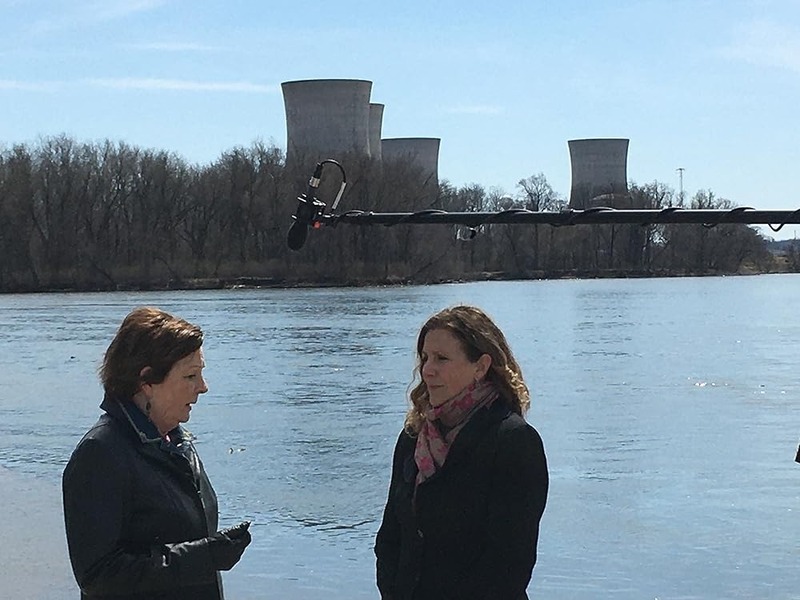
Uncovering the Veil of Nuclear Secrets
Radioactive: The Women of Three Mile Island
MOVIE REVIEW
Radioactive: The Women of Three Mile Island
-
Genre: Documentary
Year Released: 2023
Runtime: 1h 17m
Director(s): Heidi Hutner
Where To Watch: Los Angeles Theatrical Premiere on December 7, 2023, at 7:30 pm at Laemmle's Monica Film Center. Director Heidi Hutner in person with special guests! Los Angeles Theatrical Run – December 8 - 14 at the Laemmle Royal. For more information, visit www.radioactivethefilm.com
RAVING REVIEW: With RADIOACTIVE: THE WOMEN OF THREE MILE ISLAND, Heidi Hutner, a Stony Brook University professor, takes us on a narrative journey into the past, present, and future, exploring the tales of secrets that have been silenced for far too long. This stirring saga of resilience and bravery emerges after the Three Mile Island nuclear disaster. Hutner doesn't just present facts; she shows personal stories, scientific inquiry, and a flair for cinematic storytelling.
The film revisits the 1979 nuclear calamity, an event that marked a turbulent chapter in the history of American atomic energy. It brings to the forefront the lesser-known heroics of four homemakers whose determination led them to the steps of the Supreme Court, entwined with the story of a young journalist caught in the disaster's radioactive aftermath.
Hutner enriches this documentary with poignant interviews and hard evidence. Jane Fonda’s work with the documentary resonates with the actual events; her movie, THE CHINA SYNDROME, foreshadows the real-life disaster released mere weeks before the event.
At its heart, the film tells a story through the voices of those who lived in the nuclear plant's ominous shadow. These individuals recount the alarming increase in cancer cases following the disaster, lending a profound emotional dimension to the documentary. The film also spotlights a groundbreaking health study that seeks to unveil the full extent of the disaster's impact.
Hutner helps to shine a light on the extensive cover-up by General Public Utilities and the shortcomings of the U.S. Nuclear Regulatory Commission. These revelations underscore the deep-seated corruption and negligence within the nuclear industry in the late 70s.
The release of RADIOACTIVE: THE WOMEN OF THREE MILE ISLAND comes at a pivotal moment. As debates about nuclear energy as a solution to climate change intensify, the film presents a counterpoint. It is a cautionary reminder of the risks when public welfare is entrusted to corporations driven by profit. On a personal note, technology has changed in those 40 years, and with better regulations, something like this disaster should never happen again. Just as with Chornobyl, systems put in place failed the public, and that just can’t be allowed. However, we must also remember that our future depends on solutions like nuclear energy to survive.
Hutner's focus on the role of women in combating health and safety disasters is particularly noteworthy. By giving voice to these often-sidelined narratives, she offers a unique perspective on nuclear technology's historical and present-day challenges. Her dedication to this subject, spanning over two decades, is evident in her meticulous research and passionate storytelling. The documentary features interviews with experts, activists, and those directly affected, offering a complete picture of the nuclear industry's impact.
The film scrutinizes the ethics and accountability of the nuclear industry and its regulatory agencies, linking historical events to contemporary atomic debates. It also critiques societal issues such as environmental justice and the intersection of race, gender, and ecological risks. It urges reevaluating our relationship with nuclear technology challenging the status quo.
RADIOACTIVE: THE WOMEN OF THREE MILE ISLAND is a movement, a testament to the power of collective action and the importance of amplifying marginalized voices in environmental and health discussions. Hutner's film is an essential voice in the discourse on nuclear power's societal role.
While the film adeptly narrates a crucial chapter of our past, it also raises concerns about potentially deterring the future of nuclear power. Despite advancements since 1979, the documentary might create apprehension about atomic energy. Nonetheless, it's vital to consider nuclear power as a clean alternative, prioritizing safety. This documentary skillfully balances its historical narrative with current relevance, leaving viewers both enlightened and reflective.
For more reviews, please visit https://linktr.ee/overlyhonestmr.
Follow me on Letterboxd, Instagram, Twitter, and YouTube. Find my social media accounts on most platforms simply by searching Overly Honest Movie Reviews.
I’m always happy to hear from my readers; please say hi or send me any questions about movies.
[photo courtesy of FIRST RUN FEATURES]